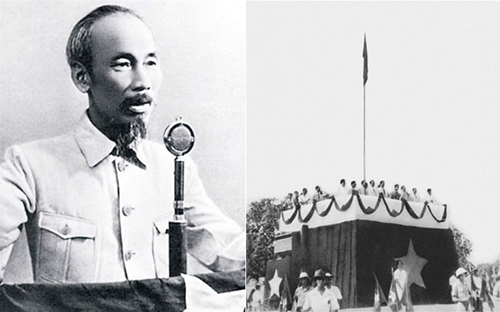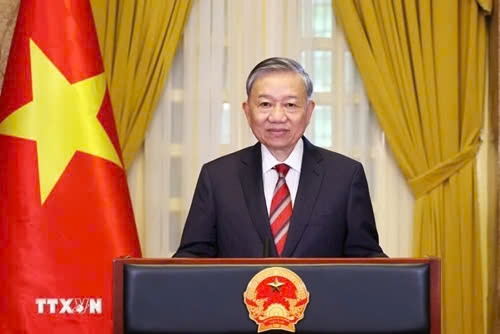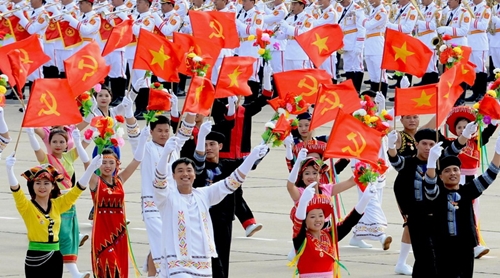Below is the translation of the article.
PROMOTING PARTY CHARACTERISTIC IN BUILDING A LAW-GOVERNED SOCIALIST STATE OF VIETNAM
Along with the implementation of the renewal and the development of a socialist-oriented market economy, our country has been step-by-step building and perfecting the law-governed socialist state of the people, by the people, for the people, under the leadership of the Party. Resolution No.27-NQ/TW dated November 9, 2022 of the 13th Party Central Committee on continuing to build and perfect the law-governed socialist state of Vietnam in the new period is a milestone and an important step forward. For the first time, our Party issued a resolution on the socialist rule-of-law state, defining such key goals as: Building of a complete legal system that is strictly and consistently abiding; respect for the Constitution and the law, respecting, ensuring and effectively protecting human rights and citizens’ rights; the state power is unified, clearly assigned, closely coordinated and effectively controlled; a professional, rule-of-law and modern administration and judiciary; a streamlined, healthy, effective and efficient state apparatus; a contingent of qualified, competent, truly professional and honest cadres, civil servants and public employees; modern and effective national governance; meeting the requirements of rapid and sustainable national development, becoming a socialist-oriented developed, high-income country by 2045. The successful realization of these goals is of important significance, a strong premise for the country to develop sustainably in the new era, the era of the rise of the nation.
    |
 |
|
On September 2, 1945, at Hanoi’s Ba Dinh Square, President Ho Chi Minh reads the Declaration of Independence declaring the birth of the Democratic Republic of Vietnam (now the Socialist Republic of Vietnam). The Declaration lays the foundation for the establishment of a rule-of-law state with the goal of independence, freedom, and happiness. (A file photo) |
Implementing Resolution No.27-NQ/TW, over the past nearly 2 years, we have achieved encouraging results. Particularly, the law-making has had many innovations, policy response capacity has been enhanced, contributing to removing difficulties and obstacles, promoting production and business, improving the material and spiritual life of the people, ensuring defense and security; the law implementation work has been increasingly linked with the law building and perfection; the administrative reform and digital transformation work has been promoted and gained certain achievements; the fight against corruption and negative phenomena has been implemented methodically, regularly and achieved many results with the spirit of no forbidden zones, no exceptions, handling one case and warning the whole region, the whole field, thereby heightening discipline, responsibility, and strictness in public duty performance.
However, the building and perfecting of the law-governed socialist state of Vietnam has still shown shortcomings and limitations. The levels of awareness of the importance of the socialist rule-of-law state of Vietnam are uneven in time and in some places. Some major policies and orientations of the Party have not been institutionalized in a timely and full manner, or have been institutionalized, but their feasibility is not high; the legal system still has contradictory and overlapping provisions, which are not suitable for socio-economic development and slow to be supplemented, amended, or replaced. Mechanisms, policies, and laws have yet to create a truly favorable environment to promote innovation and draw resources from domestic and foreign investors as well as the people. The arrangement and perfection of a streamlined, effectively and efficiently-operated State administrative apparatus with reduction in the apparatus of sectors and intermediary levels is still inadequate. There remain a number of areas in which cumbersomeness and overlaps between the legislative and the executive functions still exist, yet to really meet the requirements of improving the effectiveness and efficiency of management. Some ministries and sectors have not promoted decentralization and delegation of power to localities, doing local work instead, resulting in the existence of an asking-giving mechanism which easily gives rise to negative phenomena and corruption. Administrative reform, digital transformation, e-government and digital government building are being conducted in a still limited manner. Law and policy enforcement still show a weak link; there still exist a number of cadres in some ministries, sectors and localities who are not pro-active and lack of responsibility in public duty performance, “blaming" the legal system for not performing functions and duties.
The aforementioned shortcomings and limitations have weakened the significance and role of the law-governed socialist state of Vietnam in practice.
    |
 |
|
Party General Secretary and State President To Lam (Photo: VNA) |
Realizing the country’s development goals in the era of the rise of Vietnam requires continued innovation in the Party’s leadership and governance over the State and society; promotion of the people’s mastery and harmonious handling of the relationship in which the Party leads, the State manages and the people master and bringing into play the position and role of each of these factors in the process of building and perfecting the socialist rule-of-law state of Vietnam with due attention paid to the following basic issues:
Firstly, our Party is the ruling Party; the Party’s leadership is absolute, direct, comprehensive, covering all areas, including politics, economy, culture, social affairs, defense, security, and foreign relations. The characteristic of the law-governed socialist state of Vietnam is that it is under the leadership of the Party. Therefore, building a law-governed socialist state is a measure and a method to successfully implement the goal of our Party as defined in the Party Charter that is “building an independent, democratic, prosperous Vietnam, a fair and civilized society, no more exploitation of man by man, successfully implementing socialism and finally communism.” The Party leads through guidelines and policies; leads to institutionalize guidelines and policies into laws to manage the State and society. Therefore, the law in the socialist rule-of-law state needs to be continuously improved to institutionalize the Party’s guidelines and policies, promote democracy, serve the people, recognize, respect, ensure and protect human rights and citizens’ rights. To do that well, there must be an effective control mechanism for the institutionalization of the Party’s guidelines and policies into the State’s laws. At the same time, there must be a strict, scientific and democratic law-making process so that policies and laws fully reflect the will and aspirations of the people, protect the interests of the state, the legitimate and legal rights and interests of organizations and individuals, encourage innovation and creativity, attract all resources for development; and there must also be flexibility to promptly respond to policies, timely solutions to handle arising practical problems that slow down development according to the principle of protecting and ensuring the interests of the nation and people first and foremost. As the legislative body, the National Assembly needs to play a leading role and have solutions to ensure that the legal system is enacted to meet the requirements of the law-governed socialist state of Vietnam. The National Assembly Standing Committee should promote its role as the competent authority to interpret the law so that problems in law enforcement can be resolved in a timely fashion, meeting the requirements of life. During the organization of law enforcement, the Government needs to monitor and evaluate the situations of law enforcement to promptly detect contradictory, overlapping, and impractical legal provisions that hinder innovation, investment resource attraction, production, and business to handle them, not allowing them to become bottlenecks that prevent the implementation of human rights and civil rights, and socio-economic development.
Secondly, under the leadership of the Party, the State manages society by law, constantly promoting democracy to facilitate the people’s engagement in State management activities according to the provisions of the Constitution and the law. In the socialist rule-of-law state of Vietnam, the State apparatus is scientifically organized; the State power is unified with the division of labor and coordination among agencies in exercising legislative, executive and judicial power. Public duty performance must ensure law observance, exercise of power according to responsibilities and authority and under strict inspection and examination. In addition, as the law-governed socialist state of Vietnam is under the leadership of the Party, the leaderships in the State apparatus are structured to hold corresponding positions in Party committees responsible for leading and directing activities of agencies under the State apparatus from the central to the grassroots levels, forming a close leadership structure of the Party over State management. Based on this principle and practice, to promote the effectiveness of the State management over the society by law in the socialist rule-of-law state of Vietnam, it is necessary to simultaneously strengthen such two factors as rule-of-virtue and rule-of-law. Accordingly, the “rule-of-virtue” factor, in which advantages, strengths, positions, and roles of grassroots Party organizations, the pioneering and exemplary nature of Party cadres and Party members are promoted, leads the “rule-of-law” factor in which the society is managed by law. The rule-of-law is a manifestation of the law-governed socialist state; thus, Party cadres and Party members must set exemplary examples and take the lead in law observance. In addition, state agencies are responsible for organizing the enforcement of the law in the designated fields; therefore, Party members who are civil servants and public employees should actively handle work within their authority and well complete their tasks; pro-actively detect and resolve difficulties and obstacles in practice, especially those in law enforcement, to promptly find solutions or give suggestions and report to authorized levels for handling. In other words, there will be no socialist rule-of-law state if cadres, Party members, and state agencies are indifferent, irresponsible, and insensitive to the legitimate and legal rights of the people, businesses, and the socio-economic development.
    |
 |
|
The law in the socialist rule-of-law state needs to be continuously improved to institutionalize the Party’s guidelines and policies, promote democracy, serve the people, recognize, respect, ensure and protect human rights and citizens’ rights. (Photo for illustration: xaydungdang.org.vn) |
As the revolutionary ethics of each Party cadre and member, the sense of responsibility and initiative of each agency and unit in the state apparatus is promoted, the goals of administrative reform and judicial reform will be realized; people and businesses will truly be the center, the objects of service according to the principle of the rule-of-law so that the law will be translated into life, and the law will comprehensively and fully regulate all social relations. As a result, the society will operate and develop in accordance with the guidelines and policies issued by the Party. Since then, our country will achieve the goals of socio-economic development, defense and security assurance in accordance with the political Platform and the national development goals by 2030 and 2045 set by our Party.
Thirdly, in the socialist rule-of-law state of Vietnam, the people are identified as the masters according to the provisions of the law and act according to the principle “people know, people discuss, people do, people inspect, people supervise, people benefit.” However, to have real democracy, together with having a complete legal system according to the criteria of the socialist rule-of-law state, the effective operation of the political system must also meet and be consistent with the principle of respect for the Constitution and the law. Similar to state management, the position and role of grassroots Party organizations and the promotion of the vanguard, exemplary, and self-sacrificing qualities for the common cause of Party cadres and members are important to promote the mastery of the people in the engagement in state management and social management.
To this end, it is necessary to innovate and improve the quality of meetings of grassroots Party organizations to ensure their substantiveness and effectiveness. In addition to embracing higher levels’ documents and resolutions as currently done, contents of meetings of grassroots Party organizations should be considered to be supplemented with such topics as legal content that needs to be implemented; issues raised by legal practice related to the people’s rights; issues related to socio-economic development, and guarantee of security, order and safety that need to be resolved; issues of public opinion and the masses that need to be oriented towards viewpoints, policies and laws and the fight against wrongful viewpoints of hostile forces. To achieve the goal of building the socialist rule-of-law state of Vietnam, these practical issues need to be discussed by Party committees at all levels and thoroughly studied by Party members right from the grassroots level with the spirit that each Party cell is a cell of our Party. For the Party to be strong, each grassroots Party cell should promote its role and innovate its activities to make practical contribution to the Party. Each Party member is an important factor in spreading the spirit of democracy and the rule-of-law to the people, thereby promoting democracy among the people, making every individual and organization agree with and support the Party’s guidelines and policies, the State’s laws and pro-actively comply with and enforce the law.
Under the leadership of the Party, socialist democracy is promoted; the people are the subject of the building and perfection of the law-governed socialist state of Vietnam, in which each citizen actively and pro-actively engages in law-building and perfection with a sense of the rule-of-law which will create the strength of the entire political system to meet the goals of developing socio-economy, ensuring defense and security and bringing Vietnam into the era of the rise of the nation.
TO LAM
General Secretary of the Communist Party of Vietnam Central Committee and President of the Socialist Republic of Vietnam